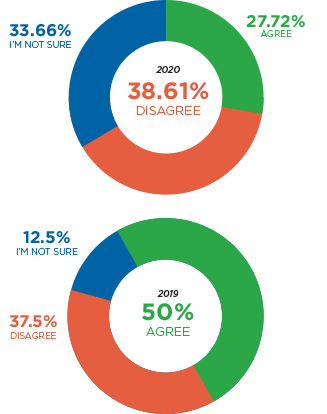Leaders Survey 2020: Problems illuminated by pandemic, yet resilience still evident
COVID, child care, talent and racial equity identified as key issues

BUSINESS RECORD STAFF Dec 10, 2020 | 7:20 pm
4 min read time
920 wordsBusiness Record Insider, Retail and Business, TransportationEditor’s note: This is a continuation of our 2020 Leaders Survey coverage, which we began publishing in the Nov. 27 issue. Our annual survey asks business leaders to share what they feel are some of the top issues affecting business in Central Iowa, and in particular the Greater Des Moines region. As you read, you’ll see the responses and also select remarks from differing viewpoints from those who opted to leave comments as they took the survey.
This year’s guest editor, Claudia Schabel, is the president of Schabel Solutions, a consulting firm that offers strategic solutions on how to build inclusive workplaces to attract and retain talent. She provided analysis of each question.
Agree or Disagree
Greater Des Moines should have a light rail system for commuters.
Agree. “If it’s cleaner and better for the community (and the pandemic is over), I’d rather use mass transit than sit alone in my car for 25 minutes to and from downtown.”
Suzanne Behnke, executive director, Iowa Center for Public Affairs Journalism – IowaWatch.org
I’m not sure. “I like the idea. I just need to understand the details, like geographic scope, cost, funding sources, impact on the environment, timeline, number of projected riders, etc.”
Chris Sackett, managing partner, BrownWinick Law Firm
I’m not sure. “I think improved public transit is critical to reducing car dependency. Whether a light rail is the right solution is something I don’t know.”
Matthew McIver, artistic director, Iowa Stage Theatre Company
Disagree. “There are not enough people or demand that could support it. Where would the money come from?”
Boyd Bauer, senior relationship manager, Heartland
Disagree. “What a waste of money that would be. Des Moines metro commutes are 25 minutes when you drive in the peak of rush hour. The need for this is even less now that so many people will work from home on a more frequent basis.”
Jennifer Pavlovec, director of finance, ChildServe
How prepared do you perceive Iowa businesses/governments to be in protecting or defending against a cyberattack?
(Scale of 1 to 10, 1 being not prepared at all)
Guest Editor Claudia Schabel: On average, respondents don’t think we are well prepared for cyberattacks, and I agree. Yes, larger organizations are responding with more and more information security technology, staff and awareness and training. But our adversaries are in it for the long haul, as well. And what about the smaller organizations without the awareness and means to fund dedicated staff and high tech for such purposes? Ultimately, it’s not a matter of if we get successfully attacked but when and how impactful the attacks will be to our bottom line, reputation and brand. We clearly need to focus and collaborate more on this topic.
6 “It seems we have appropriate contingency plans in place, but there are limited steps we can take to prevent an attack.”
Jed Gammell, vice president for insurance and financial services, Lincoln Savings Bank
6 “A wide-scale cyberattack could be the next pandemic – we know it can happen and we are likely not as prepared as collectively we should be.”
Jeff Russell, CEO, Delta Dental of Iowa
5 “It varies upon resources and understanding of cyberattacks.”
Katie Fergus, president, PractiSynergy
5 “We have 13 companies, and all of them have some exposure to cybertheft, which seems to be an ever-evolving risk for people, businesses and government. It appears the bad guys innovate as quickly as the good guys. This issue should be top of mind for all leaders.”
John Mickelson, managing partner, Midwest Growth Partners
4 “There remains general apathy toward information security in our society.”
Tej Dhawan, “responding as self”
3 “Gut feel: If the competence of the state government is anything to go by during the pandemic, then we are probably a 3 at best.”
Eric Lohmeier, president, NCP Inc.
3 “Being a cyber criminal is a full-time job. Almost no small business has a full-time cyber defender; most contract the work to an outside group. Government technology is so old, it’s likely vulnerable to threats.”
Jessica Dunker, president and CEO, Iowa Restaurant Association
2 “Many small business owners think that because they are a small business, they do not have to take cybersecurity seriously. In fact, most cyberattacks occur to small to medium-size businesses.”
Boyd Bauer, senior relationship manager, Heartland
(Scale of 1-10, 1 being not comfortable at all)

9 “Now is the time to embrace innovation and the future of transportation. Autonomous vehicles are already being tested in many other cities, and we should be doing the same here in a safe and smart way.”
Jay Byers, CEO, Greater Des Moines Partnership
8 “Of all of the places I have lived, Des Moines has the most courteous drivers, and even so, we have traffic fatalities. Technologies in this area improve over time, and allow for other industries supporting it to grow. I don’t see that autonomous vehicles will change the way people drive, or supplant current transportation options.”
Cynthia Vogel, customer service technical analyst, CDS Global
8 “The adoption of autonomous vehicles and more flexible work arrangements may make smaller communities in our region a more viable place to live as it would change how we look at our ‘daily commute.’ ”
Joe Sorenson, vice president of affiliate relations, Community Foundation of Greater Des Moines
4 “I feel the law has not caught up with the technology when it relates to accident liability.”
Katie Fergus, president, PractiSynergy











